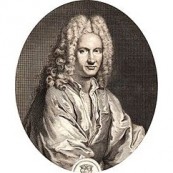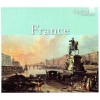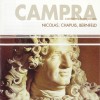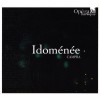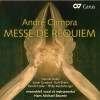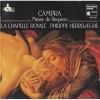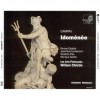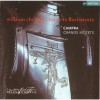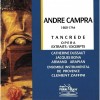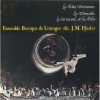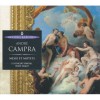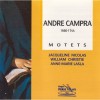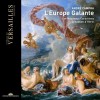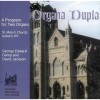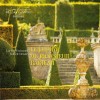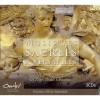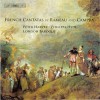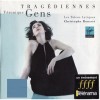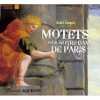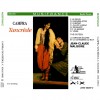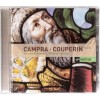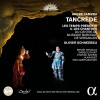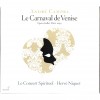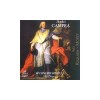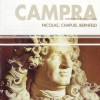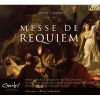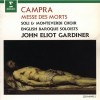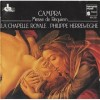Composers
André Campra (Aix-en-Provence, (baptized) 4 December 1660 – 29 June 1744 in Versailles) was a French composer and conductor.
Campra was one of the leading French opera composers in the period between Jean-Baptiste Lully and Jean-Philippe Rameau. He wrote several tragédies en musique, but his chief claim to fame is as the creator of a new genre, opéra-ballet. He also wrote three books of cantatas as well as religious music, including a requiem.
Campra was the son of Jean-François Campra, a surgeon and violinist from Graglia, in Italy, and of Louise Fabry, from Aix-en-Provence. Campra's father was his first music teacher. Campra became a choirboy at Saint-Sauveur in Aix in 1674, and commenced ecclesiastical studies four years later. He was reprimanded by his superiors in 1681 for having taken part in theatrical performances without permission, but was nevertheless made a chaplain on 27 May of that year.
From 1694 to 1700, he was maître de musique (music director) at the cathedral of Notre-Dame de Paris, after having served in a similar capacity in Arles and Toulouse. Campra controversially brought violins into the making of sacred music at Notre-Dame de Paris which at the time was seen as very avant-garde due to their reputation as 'street instruments'.[3]
He began to turn toward the theatre in 1697 and published some theatrical compositions under his brother's name to protect his reputation within the church.[3] In 1700 he gave up his post at Notre-Dame and concentrated on his theatrical music to critical success. By 1705 he was a musical celebrity but this resulted in him becoming a target for negative articles in the press.[4] From 1720 onwards, he returned to the composition of sacred music. Although Campra had obtained critical success he did not have financial security and hence in 1722 he was engaged by the Prince of Conti as maître de musique although this appointment was short lived.[4] After the death of the regent, Campra became sous-maître at the Royal Chapel in Versailles in 1723. In 1730 he became the Inspecteur Général at the Opéra (Royal Academy of Music).
He died at the age of 83.
With his composition of L'Europe galante he was the true genius of the opéra-ballet, a musical genre originated by Pascal Colasse (in his Ballet des saisons). Campra also wrote the Rigaudon.
Recently Added
Biography
André Campra (Aix-en-Provence, (baptized) 4 December 1660 – 29 June 1744 in Versailles) was a French composer and conductor.
Campra was one of the leading French opera composers in the period between Jean-Baptiste Lully and Jean-Philippe Rameau. He wrote several tragédies en musique, but his chief claim to fame is as the creator of a new genre, opéra-ballet. He also wrote three books of cantatas as well as religious music, including a requiem.
Campra was the son of Jean-François Campra, a surgeon and violinist from Graglia, in Italy, and of Louise Fabry, from Aix-en-Provence. Campra's father was his first music teacher. Campra became a choirboy at Saint-Sauveur in Aix in 1674, and commenced ecclesiastical studies four years later. He was reprimanded by his superiors in 1681 for having taken part in theatrical performances without permission, but was nevertheless made a chaplain on 27 May of that year.
From 1694 to 1700, he was maître de musique (music director) at the cathedral of Notre-Dame de Paris, after having served in a similar capacity in Arles and Toulouse. Campra controversially brought violins into the making of sacred music at Notre-Dame de Paris which at the time was seen as very avant-garde due to their reputation as 'street instruments'.[3]
He began to turn toward the theatre in 1697 and published some theatrical compositions under his brother's name to protect his reputation within the church.[3] In 1700 he gave up his post at Notre-Dame and concentrated on his theatrical music to critical success. By 1705 he was a musical celebrity but this resulted in him becoming a target for negative articles in the press.[4] From 1720 onwards, he returned to the composition of sacred music. Although Campra had obtained critical success he did not have financial security and hence in 1722 he was engaged by the Prince of Conti as maître de musique although this appointment was short lived.[4] After the death of the regent, Campra became sous-maître at the Royal Chapel in Versailles in 1723. In 1730 he became the Inspecteur Général at the Opéra (Royal Academy of Music).
He died at the age of 83.
With his composition of L'Europe galante he was the true genius of the opéra-ballet, a musical genre originated by Pascal Colasse (in his Ballet des saisons). Campra also wrote the Rigaudon.
